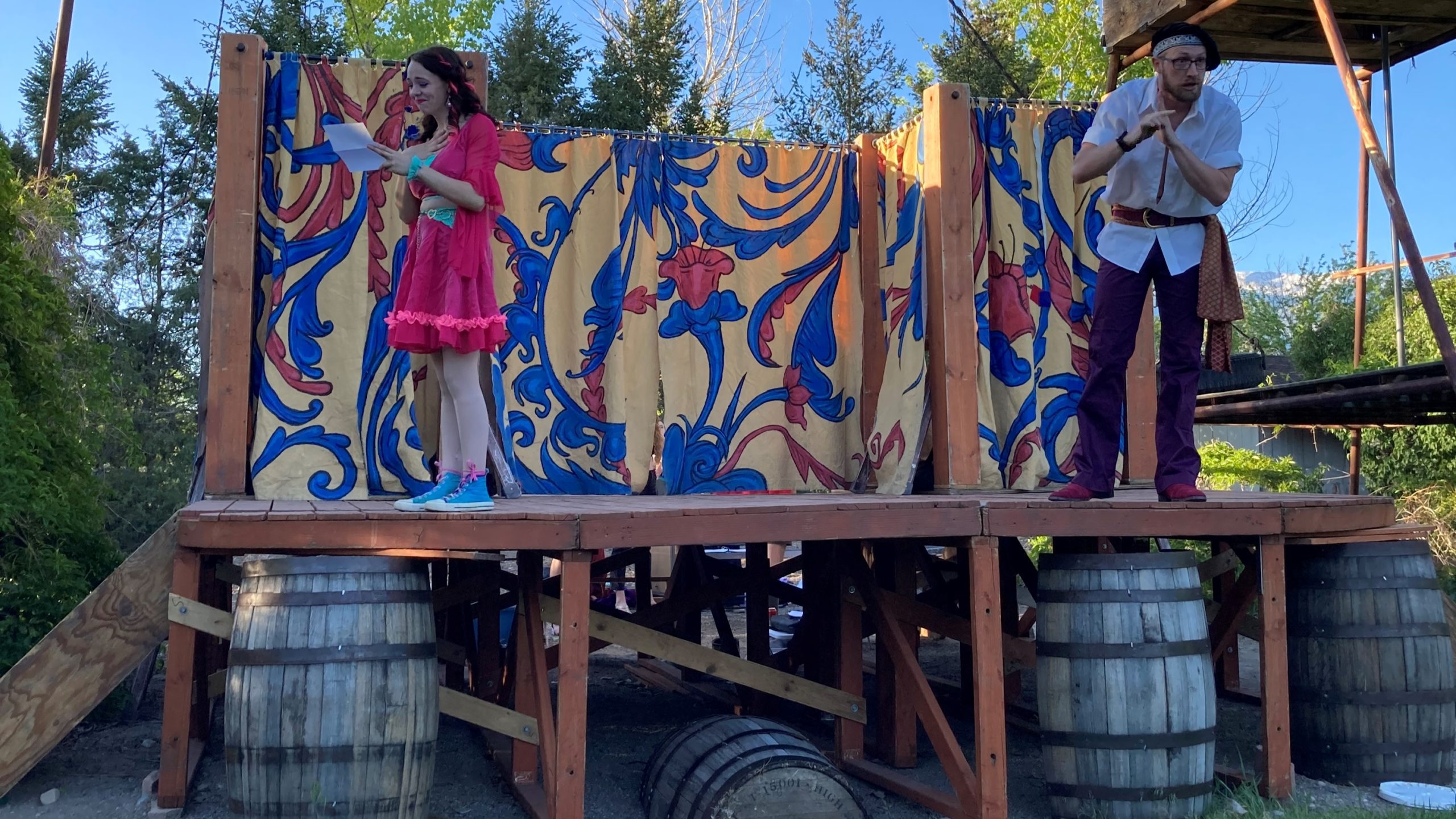PROVO — The Grassroots Shakespeare Company may look like a ragtag group of actors, but the company has been one of the most artistically ambitious companies in northern Utah. The company’s successes include a Richard III with so much blood and gore that there was a designated “splatter zone,” an all-male production of A Midsummer Nights Dream, plays by Shakespeare’s contemporaries, and a vivid and disturbing Titus Andronicus. Grassroots fans know that the company likes to test the boundaries of Shakespeare performance, and sometimes the audience is rewarded handsomely. But sometimes the gambles do not pay off, and since the COVID-19 pandemic, the company has struggled to create worthwhile shows. However, their latest production, Cymbeline, gives me hope that the company can resume its track record of artistic success.

Shakespeare could put entire wars on stage, but even by his standards, Cymbeline is a sprawling story. It begins with Imogen, the daughter of the British king Cymbeline, marrying Posthumus Leonatus. This displeases Cymbeline, who wanted Imogen to marry Cloten, the son of Cymbeline’s queen. Cymbeline drives Leonatus away. Posthumus meets Iachimo, who bets Posthumus that he can seduce Imogen. Through subterfuge, Iachimo obtains false proof of Imogen’s infidelity. Meanwhile, Cloten is trying to woo Imogen, and tensions mount between the Roman Empire and Britain when the latter nation owes tribute to Rome. Pisiano alerts Imogen to a plot to have her murdered, and she flees to Wales disguised as a boy. (Why? Because this is a Shakespeare play.) Cloten learns of Imogen’s departure and threatens Pisiano until the servant tells Cloten where he can find Imogen. In Wales, a court exile, Belarius, and his two sons discover the disguised Imogen and invite “him” to stay with them, unaware that Cloten wishes to kill Imogen for her refusal to marry him. It is a complex story, and after setting up these plot lines, Shakespeare barely has time to wrap them all up.
The perennial challenge of a Grassroots production is creating a unified show without the supervision of a director. In Cymbeline, the company overcame this challenge and connected the scenes together via a unified acting style. Each scene is performed to emphasize the action and ensure that the audience can follow the convoluted, unfamiliar story. Actors exaggerated emotions and their speaking style to make it abundantly clear which characters are villains, warriors, heroes, and more. The actors also chose to emphasize the humor of the play and add comedic elements to the production. These were viable artistic choices that were maintained consistently throughout the production.

But exaggerating the humor came at the expense of the play itself. The audience was so accustomed to laughing at the play that when the play turned serious, the show who had an inappropriate comedic tone. Even at the most serious moments of the play (such as the appearance of Jupiter or the reveal of Cloten’s dead body), the laughs kept on coming. Emphasizing the humor robbed the play of any danger or meaning.
Likewise, some of the actors made the choice to play caricatures instead of characters. While this increased the audience’s understanding, it reduced the effectiveness of the play. It was hard to believe, for example, that Imogen’s life was really threatened when Cloten (played by Alyssa Vaughn) was a constant buffoon. As the queen, Drake Hansen was garish and completely unserious, which undercut the character’s role as a scheming woman who dominates the court. Other performers were mostly bland and did little more than say their lines to move the show along.
Three actors were most earnest in their performances and gave life to their characters. Chief among them was Miranda Maurin as Imogen. Thanks to Maurin’s performance, Imogen showed the most growth; she started the play as an ingénue and ended it as an adventurous, forceful woman. Maurin was a breath of fresh air when she entered the stage, bringing energy and commitment to her scenes. Her love interest, Alex Vaughn in the role of Posthumus, had a great deal of charisma and physically dominated the stage, especially with the sword and long cape accentuating Posthumus’s stature. Alex Vaughn also had that noble quality that makes Shakespearean heroes special, most notably during the speech where Posthumus decides to enter battle and die bravely. Finally, Daisy Sherman as Pisanio brought a down-to-earth realism to her scenes. Indeed, Sherman’s performance when Pisiano despairs at the prospect of murdering Imogen was the best evening soliloquy of the evening.
Grassroots has not fully regained its past luster, but Cymbeline is the company’s best post-COVID production. It is also a worthy introduction to a complicated, yet still rewarding, play. It would have been so easy for the company to produce one of Shakespeare’s mainstream plays. The ambition it takes to mount Cymbeline, coupled with the improved artistic unity, makes me optimistic that that Grassroots will reach its former levels of greatness soon.
[box]The Grassroots Shakespeare Company production of Cymbeline plays at various locations in Salt Lake, Utah, and Weber Counties Fridays, Saturdays, and Mondays (except June 10, 11, and 20) at 7:30 PM through June 27 and on June 11 at 2 PM. Tickets are free, though a donation is encouraged. Paid performances are at part of a triple header with The Merry Wives of Windsor and Romeo and Juliet on July 8 and 9. Tickets are $15 for admission to all three plays. For more information, visit grassrootsshakespeare.com.[/box]

